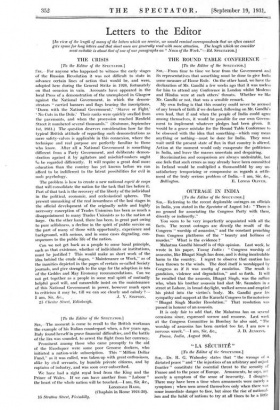Letters to the Editor
[In ritzy of the length of many of the letters which we receive, we would remind correspondents that we often cannot gzSe space for long letters and that short ones are generally read with more attention. The length which we consider most suitable is about that of one of our paragraphs on " News of the Week."-----Ed. StterAron.) THE CRISIS [To the Editor of the SPECTATOR.] Sin,--For anyone who happened to witness the early stages of the Russian Revolution it was not difficult to state in advance certain lines of action that would be, and were, adopted here during the General Strike in 1926, fortunately on that occasion in vain. Accounts have appeared in the local Press of a demonstration of the unemployed in Glasgow against the National Government, in which the demon- strators " carried banners and flags bearing the inscriptions, ' Down with the National Government,' Starve or Fight,' ' No Cuts in the Dole.' Their ranks were quickly swelled from the pavements, and when the procession reached Renfield Street it numbered several thousands." (Scotsman, September 1st, 1931.) The question deserves consideration how far the typical British attitude of regarding such demonstrations as mere safety-valves is applicable in this connexion, where the technique and real purpose are perfectly familiar to those who know. After all a National Government is something different from a Party Government, and deliberate demon- stration against it by agitators and mischief-makers ought to be regarded differently. It will require a great deal more education than the country has yet known before we can afford to be indifferent to the latent possibilities for evil in mob psychology.
The problem is how to create a new national esprit de corps that will consolidate the nation for the task that lies before it. Part of that task is the recovery of the liberty of the individual in the political, economic, and ecclesiastical spheres. The present unmasking of the real inwardness of the last stages in the official development of the originally noble and highly necessary conception of Trades Unionism has been as much a disappointment to many Trades Unionists as to the nation at large. On the other hand, there has been, in great part owing to pure selfishness, a decline in the spirit of public service on the part of many of those with opportunity, experience and background, with serious, and in some cases degrading, con- sequences to the public life of the nation.
Can we not get back as a people to some basal principle, such as that existence, whether of individuals or institutions, must be justified ? This would make as short work of the idea behind the crude slogan, " Maintenance or Work," as of the inanities depicted in the pages of certain so-called Society journals, and give strength to the urge for the adoption in toto of the Geddes and May Economy recommendations. Can we
not get together as a people in some real spirit of mutually helpful good will, and meanwhile insist on the maintenance of this National Government in power, however much open to criticism it may be, till we can see clearly and calmly ?-
I am, Sir, &c., J. Y. SIMPSON. 25 Chester Street, Edinburgh.


































 Previous page
Previous page